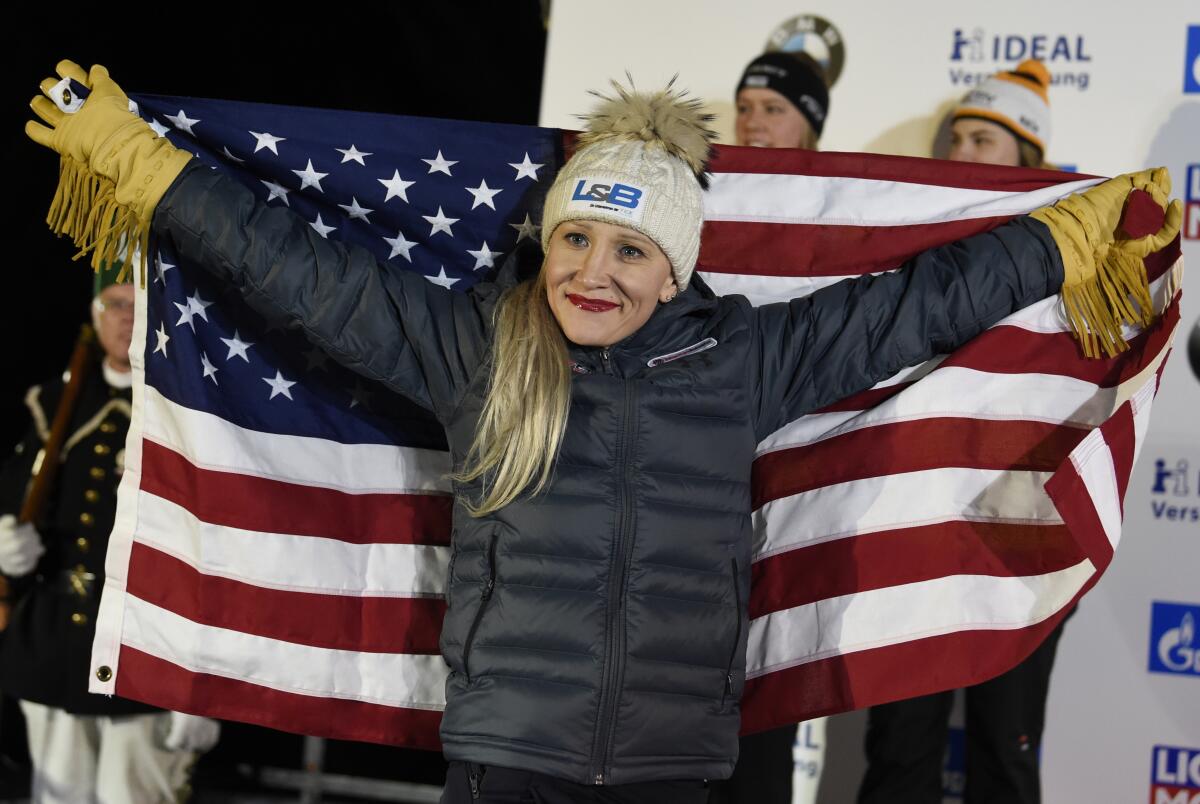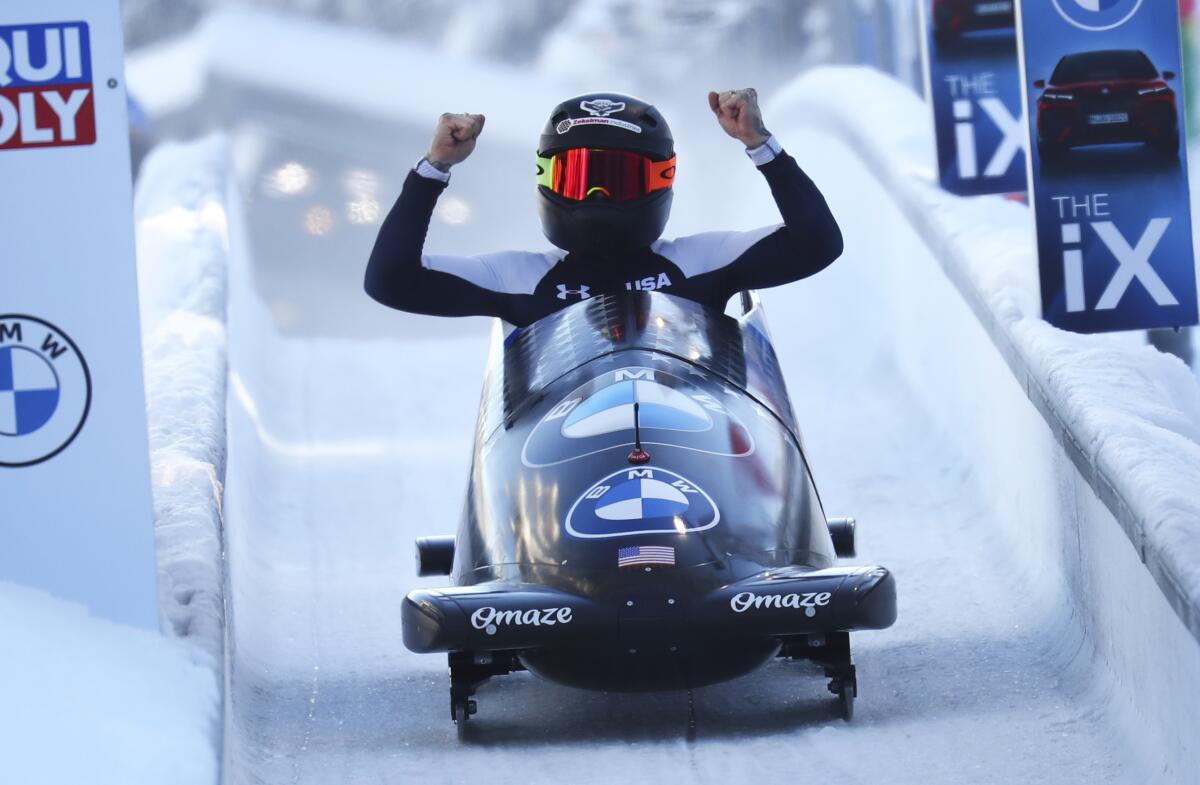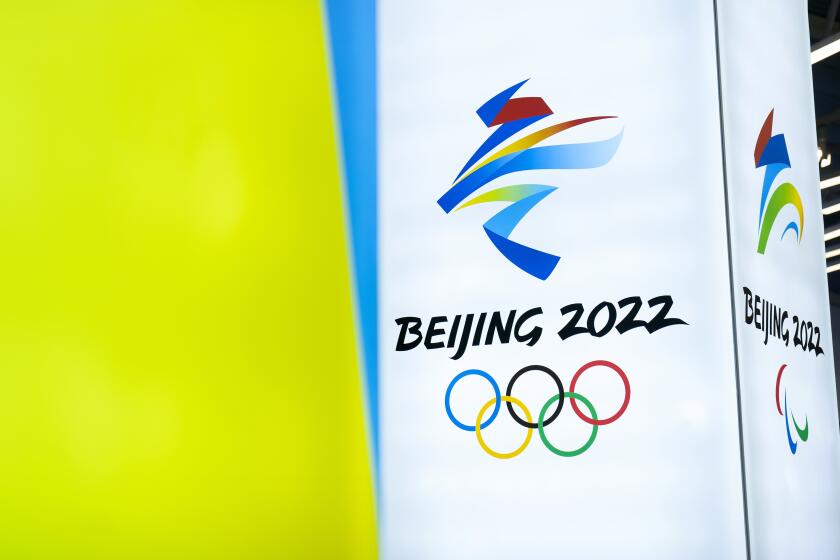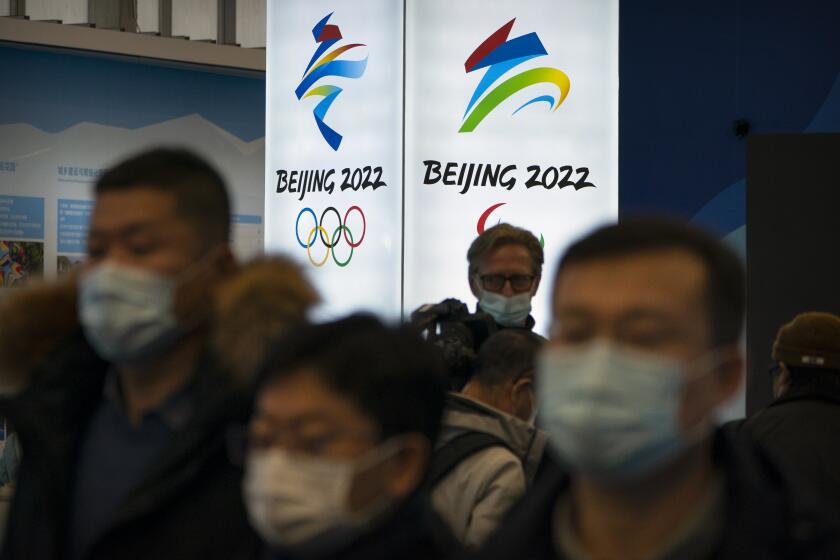Column: After protesting abuse, Kaillie Humphries’ Olympic dreams hinge on U.S. citizenship

- Share via
Kaillie Humphries is accustomed to competing against the clock, and she has become exceptionally skilled at shaving hundredths of a second off the time it takes to drive a bobsled down an icy, banked track.
At the 2014 Winter Olympics, where she teamed with Heather Moyse to win a second straight gold medal for Canada in the two-woman event, the duo’s margin of victory was 0.10. In the 2018 Olympics, Humphries and Phylicia George were 0.44 out of first — and finished third. Humphries is a five-time world champion, four in the two-woman event and one in the monobob, a solo race that will make its Winter Olympic debut next February in Beijing.
Humphries is facing another race against time, but it’s not being contested on a track. If she doesn’t win, the world’s best female bobsled pilot could be watching the Olympics from afar.
After alleging she had suffered depression as the result of verbal and emotional abuse from coach Todd Hays — and that Canadian bobsled federation officials were unresponsive when she reported his behavior — Humphries won a bitter fight to be released from the federation. She moved to Carlsbad to train and live with her husband, former U.S. bobsledder Travis Armbruster. She represented the U.S. the past two seasons and applied for U.S. citizenship, a requirement for competing for Team USA in Beijing.
“I know that there is a citizenship test. A hundred questions. I’ve been studying. Every day,” she said during a recent phone interview.
COVID-related delays have slowed the U.S. Citizenship and Immigration Service’s tedious process to a maddening crawl. She must have a U.S. passport by early January, but she’s running out of time.
The postponement of the Tokyo Olympics by a year because of COVID-19 means the 2022 Beijing Winter Olympics are less than six months away.
“It’s not necessarily being the best in the world that determines if I get to go, where it is for almost everybody else. It’s not up to me. It’s up to other people as to whether it’s warranted whether I compete. And that’s hard,” she said.
“I took the right steps. I did everything I was told to do. I did everything that I was supposed to do as an athlete, and I’m in this purgatory situation where it’s no longer up to me. I’m used to being in control as an athlete. You control your performance. How hard you work determines how well you perform and if you win. I just have to have faith in God and the system that people will understand my scenario. Hopefully we can prevent future athletes from being in this scenario ever again. I think that’s also a very important part.”
The U.S. Bobsled and Skeleton Federation, the government relations team of the U.S. Olympic and Paralympic Committee, and an immigration attorney are trying to expedite her citizenship. Jeff Rath, a Canadian litigation attorney who helped win her release from Canada’s bobsled federation, said the abuse she endured provides compassionate grounds to speed up her application. An arbitrator for the Sports Resolution Centre of Canada ruled that an investigation of her harassment claims was inadequate and incomplete and ordered a more thorough investigation to take place. That’s still pending.
“She really had no choice but to leave Canada because Bobsleigh Canada wouldn’t take her complaints or concerns seriously,” Rath said. “On that basis, as far as I’m concerned, she’s effectively a refugee.”

Humphries said she asked high-ranking members of the International Olympic Committee to recognize that supporting her quest to compete for the U.S. will help athletes feel that a spiteful coach or federation can’t punish them if they report abusive behavior.
“The IOC put in the passport rule so nations can’t poach an athlete just to compete at an Olympics, but that’s not this scenario. I didn’t get poached,” she said. “I left due to safety concerns, and I can’t go backwards because of safety concerns and I’m in this kind of purgatory middle environment where I don’t know how long it’s going to take.
“I made it known I felt unsafe in my environment. I stood up. In doing so I was removed from the team. I sought relief. I came to Team USA and now I’m in this waiting period. I would hate to see the IOC gaslight any future athletes from ever making claims out of fear that they wouldn’t have an opportunity to be an Olympian or to go to a Games and medal, because of safety.”
Unfortunately for Humphries, making her an exception on compassionate grounds doesn’t seem to have traction. Press officers from the IOC and the International Bobsleigh and Skeleton Federation, when asked about Humphries’ case, cited Rule 41 of the Olympic Charter, which says: “Any competitor in the Olympic Games must be a national of the country of the [National Olympic Committee] which is entering such competitor.”
Rath said it should count in Humphries’ favor that she followed each step toward U.S. citizenship and has a green card as a permanent resident. “There’s any number of countries in the world that would have happily issued her a passport and citizenship in exchange for the likely gold medal that that would have provided, and far more rapid than the U.S. Immigration system allows,” he said.
NHL players will participate in the 2022 Beijing Games, per an agreement by the league, NHL Players’ Assn. and the International Ice Hockey Federation.
In the meantime, Humphries trains and waits and hopes. World Cup races that determine Olympic spots will start in November and she hopes to be out of limbo by then. Even if she’s not, she doesn’t regret switching allegiance to the U.S.
“We can’t stop trying to do the right thing. I can’t be scared of not standing up and making a claim if it affects my safety and my life. Or my career,” she said. “I have to have the courage and power. That’s how change occurs, by standing up, by being brave enough to take those battles on or bring awareness to it and say, ‘This isn’t right.’”
More to Read
Go beyond the scoreboard
Get the latest on L.A.'s teams in the daily Sports Report newsletter.
You may occasionally receive promotional content from the Los Angeles Times.








